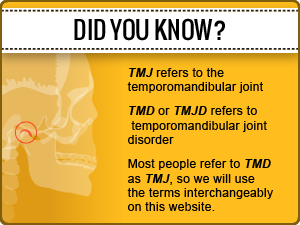3 Things to consider when choosing a TMJ provider
 Most people associate body pain with the actual sensation area, but disorders in the temporomandibular joint, located directly in front of the ear, can create pain throughout the upper body region. The truth is that much pain around the neck area and below can be related to physiologic system problems extending from the TMJ.
Most people associate body pain with the actual sensation area, but disorders in the temporomandibular joint, located directly in front of the ear, can create pain throughout the upper body region. The truth is that much pain around the neck area and below can be related to physiologic system problems extending from the TMJ.
When faced with neck, shoulder or back pain, many people turn to physiotherapists or chiropractors for relief, but, when the cause of the pain stems from the jaw, a dentist may be your best bet to help resolve the problem.
1. Training in physiologic dentistry
The TMJ is where the lower jaw connects to the base of the skull. A regular dentist may understand this relationship, but not necessarily be trained in diagnosing and repairing the problem.
Diagnosis of a TMJ disorder often requires a dentistry physician who has been specifically trained in detecting temoromandibular misalignment.
2. A clinic with the proper diagnostic technology
Standard x-rays are not the only diagnostic methods needed to pinpoint TMJ disorders. An accurate diagnosis is often done through computerized equipment designed specifically for evaluating the multiple components of the temporo-mandibular jaw joint.
Physiologic dentistry diagnosis can also require utilization of computer technology in measuring the impact on the complex muscle arrangement in the lower jaw. Dental specialists operating in a TMJ technical clinic understand that this region of the body can impact extended areas in multiple ways. The use of computer analysis can help the dental specialist track the actual path of associated referred pain in delivering an accurate diagnosis for a more effective treatment regimen.
3. A dentist who will listen to you
Talking rather than listening is not always a good treatment approach with TMJ disorders because each problem is unique is some aspect.
Finding a dentist who will listen to your particular difficulties can provide additional information to your dental history, making a significant difference in developing a treatment plan that is structured exactly to fit your dental needs. Listening to the patient can always help provide additional information to use in determining an effective treatment plan.
Learn more about TMJ
If you would like to learn more about TMJ, please download my free e-book.


